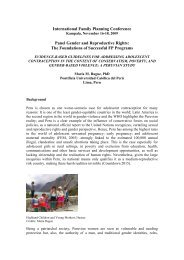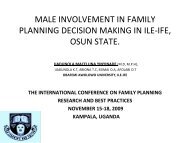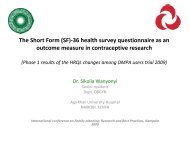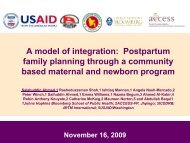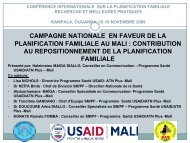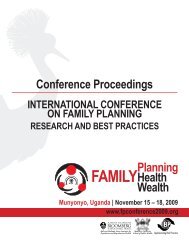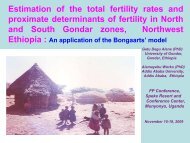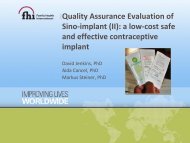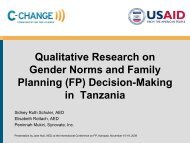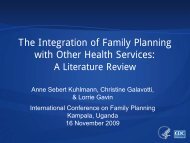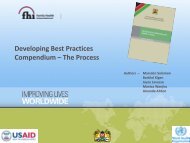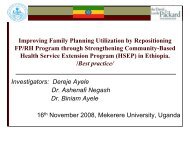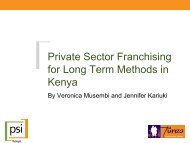Engaging Muslim Leaders in Support of Family Planning in Tanzania
Engaging Muslim Leaders in Support of Family Planning in Tanzania
Engaging Muslim Leaders in Support of Family Planning in Tanzania
You also want an ePaper? Increase the reach of your titles
YUMPU automatically turns print PDFs into web optimized ePapers that Google loves.
<strong>Engag<strong>in</strong>g</strong> <strong>Muslim</strong> <strong>Leaders</strong> <strong>in</strong><br />
<strong>Support</strong> <strong>of</strong> <strong>Family</strong> Plann<strong>in</strong>g<br />
Gregory Kamugisha<br />
Health Policy Initiative, <strong>Tanzania</strong><br />
<strong>in</strong> <strong>Tanzania</strong><br />
November 17 th 2009<br />
International Conference on <strong>Family</strong> Plann<strong>in</strong>g<br />
Kampala, Uganda<br />
1a
<strong>Tanzania</strong> – RH, Population, and Development<br />
• Population Size: Estimated 41 million <strong>in</strong> 2009,<br />
grow<strong>in</strong>g at 2.9 percent per year<br />
• Low-<strong>in</strong>come country with per capita <strong>in</strong>come <strong>of</strong><br />
$400 (WB, 2009), 75 percent is rural population<br />
• Total fertility rate: 5.7 children per woman, 6.5<br />
children per woman <strong>in</strong> rural areas (TDHS, 2004-05)<br />
• Two-thirds <strong>of</strong> women are married by age 20 and<br />
half <strong>of</strong> women give birth before age 20<br />
2
<strong>Tanzania</strong> – RH, Population and Development…2<br />
• Maternal mortality rate: 578 per 100,000 live births<br />
• 55 percent <strong>of</strong> births are <strong>in</strong> avoidable high-risk<br />
category<br />
• Use <strong>of</strong> modern contraceptive methods is 20 percent<br />
and 26 percent for all methods<br />
• Religious beliefs have strong <strong>in</strong>fluence on<br />
contraceptive use and nearly half <strong>of</strong> population are<br />
<strong>Muslim</strong>s<br />
3
Less Females Ascend <strong>in</strong> Education<br />
80<br />
70<br />
60<br />
50<br />
40<br />
30<br />
20<br />
10<br />
0<br />
Primary<br />
Education<br />
Education and Tra<strong>in</strong><strong>in</strong>g Policy<br />
Proposal, 2009; <strong>Tanzania</strong> M<strong>in</strong>istry <strong>of</strong><br />
Education and Vocational Tra<strong>in</strong><strong>in</strong>g<br />
Ord Sec<br />
Education<br />
Advanced Sec<br />
Education<br />
Bachelors<br />
Admissions<br />
Females<br />
Males<br />
4
<strong>Tanzania</strong>: Modern CPR <strong>in</strong> Married Women 2004-05<br />
12%<br />
15% 9%<br />
13%<br />
8%<br />
24%<br />
11%<br />
2004-05 TDHS – ORC Macro and TBS<br />
8%<br />
17%<br />
35%<br />
17%<br />
22%<br />
26%<br />
35%<br />
30%<br />
38%<br />
12% Manyara<br />
6% Pemba North<br />
8% Pemba South<br />
Kigoma<br />
Kagera<br />
Rukwa<br />
Mwanza<br />
Sh<strong>in</strong>yanga<br />
Tabora<br />
Mbeya<br />
Percentage <strong>of</strong> currently<br />
married woman us<strong>in</strong>g<br />
any modern method<br />
Mara<br />
Arusha<br />
S<strong>in</strong>gida<br />
Dodoma<br />
Ruvuma<br />
Kili.<br />
Tanga<br />
29%<br />
19%<br />
Ir<strong>in</strong>ga<br />
Pwani<br />
Morogoro<br />
L<strong>in</strong>di<br />
30%<br />
26%<br />
Mtwara<br />
National Average: 20%<br />
5% Zanzibar North<br />
17% Zanzibar South<br />
11% Town West<br />
Dar- 35%<br />
Higher than<br />
national<br />
average<br />
Less than<br />
national<br />
average<br />
5
<strong>Engag<strong>in</strong>g</strong> <strong>Muslim</strong> <strong>Leaders</strong> to<br />
<strong>Support</strong> FP:<br />
How the Program Worked<br />
6
Seek<strong>in</strong>g the Ulamaa <strong>Support</strong> for FP: The Methodology…1<br />
• HPI/TO1 consulted the National <strong>Muslim</strong>s Council <strong>of</strong><br />
<strong>Tanzania</strong> (BAKWATA) through the Faith Based<br />
Advocacy Group (FBAG) formed before.<br />
• BAKWATA and FBAG recommended a consultative<br />
meet<strong>in</strong>g with members <strong>of</strong> the Supreme Clerical<br />
Council <strong>of</strong> <strong>Muslim</strong>s (Ulamaa).<br />
• Consultative meet<strong>in</strong>g was organized <strong>in</strong> which HPI<br />
<strong>in</strong>troduced Ulamaa members to the national and<br />
household development challenges associated with<br />
reproductive health and population.<br />
7
Seek<strong>in</strong>g the Ulamaa <strong>Support</strong> for FP: The Methodology…2<br />
• Orientation to Ulamaa used the RAPID<br />
model package as well as other evidence-<br />
based materials like TDHS with <strong>in</strong>dicators on<br />
the maternal and child health situation.<br />
• Used video materials show<strong>in</strong>g clarifications<br />
on FP/RH matters and commitment <strong>of</strong> other<br />
prom<strong>in</strong>ent <strong>Muslim</strong> leaders and scholars from<br />
African countries <strong>of</strong> Mali, Mauritania,<br />
Senegal, Ghana, and Uganda.<br />
• Presentations specifically requested for an<br />
Official <strong>Support</strong> Statement for FP from the<br />
Ulamaa.<br />
8
Seek<strong>in</strong>g the Ulamaa <strong>Support</strong> for FP: The Methodology…3<br />
• Discussion on the presented materials was heated,<br />
sometimes emotional, and concluded on two steps:<br />
(i) Members <strong>of</strong> the Ulamaa tak<strong>in</strong>g time to review the<br />
presented materials and consult the Holy Books before<br />
decid<strong>in</strong>g whether and how to issue the sought supportive<br />
statement<br />
(ii)Form<strong>in</strong>g a small Technical Committee to further review<br />
the presented materials, make reference to the Holy<br />
Books like Holy Quran and Khadiths and advise on the<br />
approach and premises over which the <strong>of</strong>ficial <strong>Support</strong>ive<br />
Statement could be built.<br />
9
Summary Deliberations and<br />
Recommendations <strong>of</strong> the<br />
Technical Committee<br />
10
Seek<strong>in</strong>g the Ulamaa <strong>Support</strong> for FP: The Methodology…4<br />
• There are no specific paragraphs or verses <strong>in</strong> the Holy<br />
Quran that <strong>in</strong>struct or prohibit use <strong>of</strong> FP services among<br />
<strong>Muslim</strong>s.<br />
• In such situation, Holy Books’ <strong>in</strong>struction to <strong>Muslim</strong>s is to<br />
use their common sense <strong>in</strong> determ<strong>in</strong><strong>in</strong>g what is logical for<br />
their own benefits.<br />
• There are several verses which warn that fear <strong>of</strong> poverty<br />
should not be used as a reason to limit child bear<strong>in</strong>g.<br />
• Islam outl<strong>in</strong>es responsibilities <strong>of</strong> parents to their children<br />
(e.g. provid<strong>in</strong>g them with good guidance, protection, food,<br />
education, healthcare) as well as the responsibilities <strong>of</strong><br />
children to their parents.<br />
11
Seek<strong>in</strong>g the Ulamaa <strong>Support</strong> for FP: The Methodology…5<br />
• Islam <strong>in</strong>sists on the well be<strong>in</strong>g <strong>of</strong> mothers and their children, and<br />
this responsibility is left to the men as husbands and fathers.<br />
• FP can be directly advocated for on the grounds <strong>of</strong> preserv<strong>in</strong>g<br />
good health for mothers. The Holy Quran prohibits <strong>Muslim</strong>s from<br />
putt<strong>in</strong>g themselves <strong>in</strong> danger or term<strong>in</strong>at<strong>in</strong>g their lives<br />
unnecessarily (Q.4:29).<br />
• If the well be<strong>in</strong>g <strong>of</strong> children, born or expected, is considered to be<br />
put at risk because <strong>of</strong> the mother hav<strong>in</strong>g to bear another child, this<br />
makes another reason for FP. <strong>Muslim</strong>s are wished by their Creator<br />
good and light th<strong>in</strong>gs, not heavy burdens (Q. 2:185).<br />
• For acceptability purpose, the statement needs to be based on the<br />
health and well be<strong>in</strong>g <strong>of</strong> mother and children.<br />
12
Results <strong>of</strong> the Advocacy<br />
Intervention<br />
13
<strong>Engag<strong>in</strong>g</strong> <strong>Muslim</strong>s <strong>Leaders</strong> for FP – Results<br />
• Second Ulamaa meet<strong>in</strong>g was convened where members<br />
exchanged notes and received the report and<br />
recommendations <strong>of</strong> the Technical Committee<br />
• The Official Clerical Statement (Fatwa) was issued as:<br />
(i) In Islam, Birth Spac<strong>in</strong>g is Permitted <strong>in</strong> Marriage Alone<br />
(ii) In Marriage, Birth Spac<strong>in</strong>g is Permitted only when it is really Needed<br />
such as for Preserv<strong>in</strong>g the Health <strong>of</strong> Mothers and Children, already<br />
Born or Expected<br />
(iii) In circumstances where Birth Spac<strong>in</strong>g is really Needed, any Safe and<br />
Legal Method can be Used<br />
(iv) Islam does not <strong>in</strong>struct for Reckless Childbear<strong>in</strong>g. Because <strong>of</strong> that, Birth<br />
Spac<strong>in</strong>g can be Applied for the Benefits and Development <strong>of</strong> the <strong>Family</strong><br />
14
<strong>Engag<strong>in</strong>g</strong> <strong>Muslim</strong>s <strong>Leaders</strong> for FP – Some Lessons<br />
• Mak<strong>in</strong>g references to Holy Books and l<strong>in</strong>k<strong>in</strong>g the teach<strong>in</strong>gs to<br />
the local evidence and environment.<br />
• Show<strong>in</strong>g support <strong>of</strong> religious leaders and scholars from other<br />
countries support<strong>in</strong>g FP.<br />
• Enabl<strong>in</strong>g trusted and respected <strong>Muslim</strong> leaders and scholars to<br />
lead the process.<br />
• Foster<strong>in</strong>g flexibility <strong>in</strong> discussion, tolerance, and be<strong>in</strong>g<br />
accommodative <strong>of</strong> different op<strong>in</strong>ions as well as focus<strong>in</strong>g on the<br />
bigger picture.<br />
• Focus<strong>in</strong>g on the contribution <strong>of</strong> FP to maternal and child health<br />
was more persuasive than the challenges <strong>of</strong> serv<strong>in</strong>g a larger<br />
population.<br />
15
Issu<strong>in</strong>g the Fatwa <strong>in</strong> <strong>Support</strong> <strong>of</strong> FP <strong>in</strong> <strong>Tanzania</strong><br />
Thank You Very Much!<br />
Ahsante Sana!<br />
• The Sheikhs follow<strong>in</strong>g<br />
the presentations<br />
before decid<strong>in</strong>g on the<br />
Fatwa.<br />
• Several other Sheikhs<br />
gave detailed<br />
clarifications on po<strong>in</strong>ts<br />
<strong>of</strong> the Fatwa on video<br />
record.<br />
16



